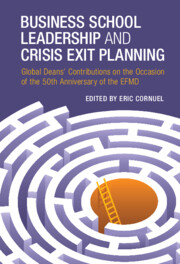The decision to mobilize a number of deans of some of the most internationally eminent business schools and management faculties to produce the present book – Business School Leadership and Crisis Exit Planning: Global Deans’ Contributions on the Occasion of the 50th Anniversary of the EFMD – was made in the first half of 2020 as the world sank into the COVID-19 crisis.
A worldwide feeling of uncertainty was emerging that had consequences for both the management and the strategy of business schools, as well as for the future of management education itself.
A strong need was felt for analytical reflection that would not only outline prospects for facing the crisis – the form, intensity, and consequences of which were completely unknown to us – but also create the conditions for exiting it.
From this point of view, the contributions that make up this work perfectly achieve their objective, offering an exhaustive perspective on the issue of crisis management, structured around four major issues that constitute the four major parts of the book:
- Reexamining the purpose of business schools and, more generally, of management education in light of the crisis
- Reexamining the relationship (existential? alienating? legitimizing?) between businesses and business schools
- Taking stock of the uncertainty of the future of business schools through the example of internationalization, which was supposed to constitute a fundamental and inexorable trend in management education but was largely undermined by the COVID-19 crisis
- Studying the peculiarities of how business schools managed the COVID-19 crisis.
These lines of thinking resonate with the most fundamental thoughts and methods of development adopted by the China Europe International Business School (CEIBS) with respect to the COVID-19 crisis. The CEIBS took a proactive role in responding to the crisis from the outset, driven by a proactive desire to make a positive contribution to rethinking the “business school mission” and “practices.” As such, the school was not only quick to sign up for this project but also immediately agreed to sponsor it. Producing this compendium of strategic thinking on the problems posed by the COVID-19 pandemic matched our overarching goal to always do our best to make a positive impact on society and bridge the gulf between higher education and social values.
However, this foreword is being written at the beginning of the year 2021. All contributions have been submitted, and the book offers a coherent whole. But one fundamental question arises. Although COVID-19 prompted this book project, it is clear as of the middle of 2021 that the global climate has changed. In China and in Europe, the two places of residence of the two authors of this foreword, we find ourselves much more in the post–COVID-19 recovery period than in a period of crisis management. This is also true for many other parts of the world, such as in North America, Oceania, and so on, even though the intensity and the consequences of the crisis remain, making its disastrous effects felt hard in other parts of the world.
So, isn’t this book coming out too late? Wouldn’t we do better to wait for a book on the strategies business schools adopt to accompany the growth of a post-crisis period?
On careful reflection, however, the authors of this foreword remain convinced that this work is still profoundly relevant. If we refer to the notion of event as defined by Hannah Arendt, the COVID-19 crisis constitutes an “unexpected event.” This crisis is the ideal opportunity to explore new approaches to managing operations, and defining good practices, through analyses and new perspectives – all without ever adopting the totalitarian posture of “this is how it should be done” or “it is inexorable.” In conclusion, this book thus offers a complete picture of what happened to business schools and how they navigated these uncharted waters. The steps taken by their leadership worldwide pave the way for future reckoning.
The reader of this book, in approaching the rich plurality of its contributions, will thus find useful proposals and thinking, all while turning away from the totalizing analyses of an exceptional event that led to a global crisis.



